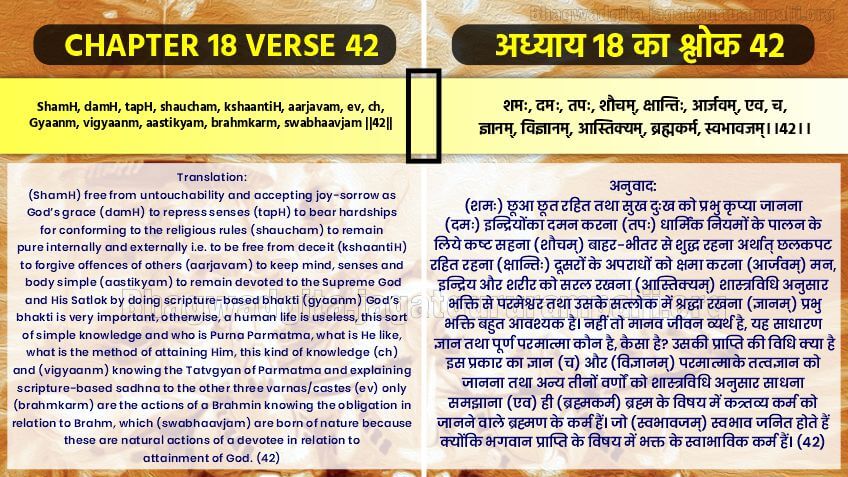
ShamH, damH, tapH, shaucham, kshaantiH, aarjavam, ev, ch,
Gyaanm, vigyaanm, aastikyam, brahmkarm, swabhaavjam ||42||
Translation: (ShamH) free from untouchability and accepting joy-sorrow as God’s grace (damH) to repress senses (tapH) to bear hardships for conforming to the religious rules (shaucham) to remain pure internally and externally i.e. to be free from deceit (kshaantiH) to forgive offences of others (aarjavam) to keep mind, senses and body simple (aastikyam) to remain devoted to the Supreme God and His Satlok by doing scripture-based bhakti (gyaanm) God’s bhakti is very important, otherwise, a human life is useless, this sort of simple knowledge and who is Purna Parmatma, what is He like, what is the method of attaining Him, this kind of knowledge (ch) and (vigyaanm) knowing the Tatvgyan of Parmatma and explaining scripture-based sadhna to the other three varnas/castes (ev) only (brahmkarm) are the actions of a Brahmin knowing the obligation in relation to Brahm, which (swabhaavjam) are born of nature because these are natural actions of a devotee in relation to attainment of God. (42)
Translation
Free from untouchability and accepting joy-sorrow as God’s grace, to repress senses, to bear hardships for conforming to the religious rules, to remain pure internally and externally i.e. to be free from deceit, to forgive offences of others, to keep mind, senses and body simple, to remain devoted to the Supreme God and His Satlok by doing scripture-based bhakti, God’s bhakti is very important, otherwise, a human life is useless – this sort of simple knowledge and who is Purna Parmatma, what is He like, what is the method of attaining Him, this kind of knowledge, and knowing the Tatvgyan of Parmatma and explaining scripture-based sadhna to the other three varnas (castes) only are the actions of a Brahmin knowing his duty in relation to Brahm, which are born of nature because these are natural actions of a devotee in relation to attainment of God.
शमः, दमः, तपः, शौचम्, क्षान्तिः, आर्जवम्, एव, च,
ज्ञानम्, विज्ञानम्, आस्तिक्यम्, ब्रह्मकर्म, स्वभावजम्।।42।।
अनुवाद: (शमः) छूआ छूत रहित तथा सुख दुःख को प्रभु कृप्या जानना (दमः) इन्द्रियोंका दमन करना (तपः) धार्मिंक नियमों के पालनके लिये कष्ट सहना (शौचम्) बाहर-भीतरसे शुद्ध रहना अर्थात् छलकपट रहित रहना (क्षान्तिः) दूसरोंके अपराधोंको क्षमा करना (आर्जवम्) मन, इन्द्रिय और शरीरको सरल रखना (आस्तिक्यम्) शास्त्रा विधि अनुसार भक्ति से परमेश्वर तथा उसके सत्लोक में श्रद्धा रखना (ज्ञानम्) प्रभु भक्ति बहुत आवश्यक है। नहीं तो मानव जीवन व्यर्थ है, यह साधारण ज्ञान तथा पूर्ण परमात्मा कौन है, कैसा है? उसकी प्राप्ति की विधि क्या है इस प्रकार का ज्ञान (च) और (विज्ञानम्) परमात्माके तत्वज्ञान को जानना तथा अन्य तीनों वर्णों को शास्त्रा विधि अनुसार साधना समझाना (एव) ही (ब्रह्मकर्म) ब्रह्म के विषय में कत्र्तव्य कर्म को जानने वाले ब्रह्मण के कर्म हैं। जो (स्वभावजम्) स्वभाव जनित होते हैं क्योंकि भगवान प्राप्ति के विषय में भक्त के स्वाभाविक कर्म हैं। (42)
